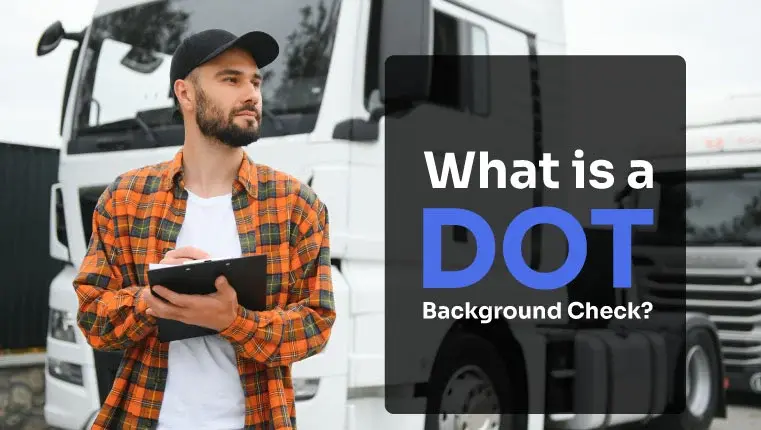A DOT background check refers to the screening and verification of employees or individuals involved in transporting goods by road. This process involves reviewing applicants’ commercial driving history as mandated by the Department of Transportation (DOT). Employers use this procedure to ensure that their drivers meet the DOT regulations when hiring for jobs requiring a Commercial Driver’s License (CDL). DOT background checks are crucial for maintaining safety standards in the transportation industry and protecting the public from potential risks associated with unqualified or unsafe drivers.
The DOT background check includes various components such as a review of the driver’s license status, traffic violations, criminal history, employment history, and compliance with drug and alcohol testing regulations.
What Companies Require DOT Background Checks?
Companies looking to hire individuals for positions involving the use of a CDL must conduct a DOT background check. This includes a wide range of businesses such as trucking companies, bus companies, companies transporting liquids, construction companies, and many others. Employers who move their own products, such as retail companies with their own fleet, are legally required to conduct DOT background checks for employees who will drive vehicles with a weight of greater than 10,000 pounds or those that haul hazardous materials (Hazmat). Background screening companies help employers make informed decisions when hiring but sometimes companies make big mistakes causing candidates to fail background checks. When this happens, consider contacting attorneys for consumer protection for immediate help.

How Long Do DOT Background Screenings Take?
Typically, a DOT background check takes about 1-2 weeks to complete. But depending on the screening, it can take a month or more. The duration can vary based on the following:
- The extent of the search
- The number of years the employer is reviewing
- The number of counties or states being checked
- The amount of information to be collected about the applicant
If an employer needs to verify records from multiple states or counties, it may take longer to gather all the necessary information. Additionally, the depth of the search, such as reviewing a driver’s history over a more extended period, can also impact the duration.
What Do Employers Look for in DOT Background Checks?
Employers have a responsibility to check a driver’s record for safety concerns or violations. Key items assessed in DOT background checks can include the following.
- License Records. These records include checking whether the driver’s license is suspended, expired, or valid, and reviewing records of traffic accidents, traffic violations, driving under the influence, serious offenses, and convictions.
- Employment History. Employers verify if the details provided in an application are accurate and identify any gaps in employment. This helps in assessing the candidate’s reliability and work ethic.
- Criminal Records. Candidates with felony or misdemeanor cases in their records may be dismissed. A thorough criminal background check helps employers identify potential risks and ensure they are not hiring individuals with a history of serious offenses
- Pre-employment Test Results. This includes random pool testing and any history of drug and alcohol test failures. Employers need to ensure that drivers are free from drug related issues that might impair their ability to operate a commercial vehicle safely.
By conducting background checks, employers can mitigate risks and ensure compliance with DOT regulations, ultimately contributing to safer roadways and reducing the likelihood of accidents. Although background screening companies help companies hire the most qualified candidates, there are times when background check errors prevent talented candidates from gaining employment. When this happens, it’s important to dispute the errors and request that the screening company conduct an investigation right away.
How Far Back Do DOT Background Screenings Go?
For a driver’s record, safety performance history with previous employers, and drug and alcohol tests, DOT background checks usually cover a minimum of 3 years. The criminal record search is more comprehensive, covering at least the prior 7-10 years. For certain positions, such as hazmat transport, the search may extend back to the driver’s entire life. The extent of the background check depends on the type of job and the level of risk associated with the position.
What Happens if I Fail a DOT Background Check?
If a DOT background check reveals an offense or activity prohibited by the DOT such as a felony conviction or a positive drug test you will most likely fail the process and be unable to operate a vehicle requiring a CDL. Some offenses permit a candidate to reapply after a specified period. Other offenses, like felony human trafficking, may result in a permanent ban.
Failing a DOT background check can have serious implications for a candidate’s career. In some cases, the candidate may be allowed to reapply after a certain period, provided they have addressed the issues that led to the failure.
Candidates who fail a DOT background check because of background check errors should take steps to address the issues identified in the report. Addressing these errors includes seeking legal advice when necessary.
What to Do if I Find Errors in a DOT Background Check?
If you find an error in your DOT background check report, you should notify the reporting agency and the background screening firm, and fild a dispute. Contacting a consumer attorney at this point is a wise idea. They can walk you through the dispute process to help protect your rights and maximize the likelihood of success.
As part of the dispute process, you may need to present evidence, such as court records, to prove that the information is incorrect. The background screening company is mandated by the Fair Credit Reporting Act (FCRA) to investigate and resolve disputed items within 30-days.
Errors in background check reports can occur due to various reasons, such as clerical mistakes, outdated information, or incorrect data entries. If you believe there are mistakes contained in your report, it is critical to act immediately and gather evidence that supports your position. Evidence can include court records, employment records, any other documentation that can help prove that the information in the report is inaccurate.
If a mistake is found, the report should be corrected, and you can then notify your prospective employer. If the screening company does not correct an error, you likely have grounds to file a lawsuit and seek compensation. Be sure to weigh all of your options when finding and disputing errors as doing so can be life changing!

